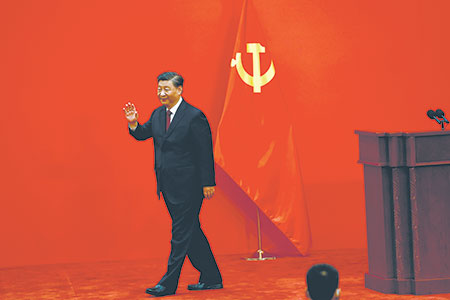
The Communist Party of China (CPC) is convening a pivotal Plenum in Beijing, where the nation’s leadership will lay the groundwork for its economic development plan spanning 2026 to 2030. General Secretary Xi Jinping is anticipated to deliver a key address, underscoring China’s imperative to assert global leadership in high technology and artificial intelligence. Discussions at this crucial gathering are also expected to touch upon significant personnel changes, following recent official announcements regarding investigations into People’s Liberation Army (PLA) generals accused of corruption or breaches of party ethics.
This high-level meeting of approximately 370 Central Committee members unfolds against a backdrop of escalating trade tensions between China and the United States. Speculation also surrounds a potential encounter between President Xi and U.S. President Donald Trump on the sidelines of the Asia-Pacific Economic Cooperation summit in South Korea later this month. While Beijing consistently reiterates its commitment to national sovereignty and resistance to external pressure, the deep-seated trade and technology disputes with Washington are almost certainly a central theme for debate within the Plenum’s closed-door sessions.
Though not open to the press, these Plenums are where critical decisions shaping China’s future are forged. The current session is projected to last four days, from October 20th to 24th, with a primary focus on outlining the core tenets of the upcoming five-year plan. These preliminary guidelines will be further refined until April 2026, when they are presented to the National People’s Congress (NPC), China’s top legislative body, for final approval. President Xi’s speech is expected to heavily feature this overarching economic strategy.
According to Ling Song, chief economist at ING bank in Amsterdam, while the full text of the plan will only be released after NPC endorsement, fundamental deviations from the style and directives of the previous five-year plan are not anticipated. China’s economy, the world’s second-largest, experienced a 5% growth last year, with the World Bank forecasting a 4.8% expansion for the current year, indicating a slight but noticeable moderation.
The Chinese economy is navigating a complex landscape of challenges. Foremost among these is the ongoing trade conflict, which intensified significantly following the Trump administration’s ascent. Concurrently, chronic internal issues continue to temper economic growth. The government is actively seeking to stimulate consumer spending and private sector investment, while simultaneously striving to rein in excess production capacity across numerous industrial sectors. Yet, President Xi is widely expected to renew his call for China’s transformation into a preeminent global leader in high technology and artificial intelligence, asserting a strategic direction for the nation’s economic evolution.
International experts emphasize the critical importance of boosting consumer expenditure at this juncture. However, caution prevails among Chinese consumers, a sentiment partly attributed to the recent burst of the property market bubble several years ago, which left thousands of high-rise apartment buildings unoccupied. This situation has fueled extensive debate within China regarding the optimal economic model for the nation’s continued development.
Beyond the five-year plan, a significant portion of the Plenum’s agenda is likely devoted to personnel matters. Chinese state television and the military’s official newspaper, “Jiefangjun Bao,” have reported the expulsion of eight generals from the Party. This group includes He Weidong, formerly the third most senior figure in the military hierarchy. Chinese media reports suggest General He faces accusations of corruption and abuse of power. As a Politburo member and Vice Chairman of the Central Military Commission – the body through which the Party commands the armed forces – his prominent position, as noted by The New York Times, placed him directly after Xi and one other general in military influence.
General He’s disappearance from official publications earlier this year had already sparked speculation about his fate, despite the classified nature of military personnel data. While the Ministry of Defense has refrained from divulging details of the investigations into He and other military officers, Senior Colonel Zhang Xiaogang, a spokesperson for the ministry, affirmed that “punishment shows that corrupt elements in the armed forces will not escape accountability.” This follows the expulsion last year of Admiral Miao Hua, who headed the armed forces’ political department, signaling a broader and sustained effort.
Mark Parker Young, former Deputy Assistant Director of U.S. Intelligence for East Asia, offered his assessment of the purges within the PLA, commenting that Xi’s readiness to subject the PLA’s internal dynamics to scrutiny in his anti-corruption drive suggests China’s leader is not contemplating immediate military conflict. Alexander Lukin, research director at the Institute of China and Contemporary Asia of the Russian Academy of Sciences, echoed that while Plenums focused on five-year plans are routine, the current political climate, particularly Trump’s threats of 100% tariffs on Chinese exports, significantly complicates discussions. Lukin believes these issues will be central to the Plenum, possibly drawing commentary from Xi Jinping himself, asserting that the U.S. seeks to contain China’s rise. Despite potential bilateral agreements, he anticipates the rivalry between the two powers to persist.
Regarding the dismissal of generals, Lukin noted that Xi’s anti-corruption campaign dates back to his ascent to power in 2012, initially targeting high-ranking party officials. This initiative has now extended to the military, where generals are being sanctioned not only for direct corruption but also for failing to adhere to the ethical standards expected of CPC members.
